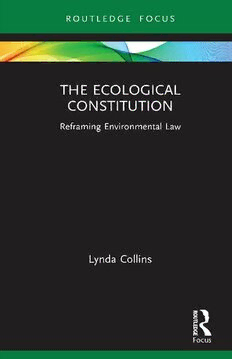
The Ecological Constitution: Reframing Environmental Law PDF
Preview The Ecological Constitution: Reframing Environmental Law
The Ecological Constitution The Ecological Constitution integrates the insights of environmen- tal constitutionalism and ecological law in a concise, engaging and accessible manner. This book sets out the necessary components of any constitu- tion that could be considered “ecological” in nature. In particu- lar, it argues that an ecological constitution is one that codifies the following key principles, at a minimum: the principle of sus- tainability; intergenerational equity and the public trust doctrine; environmental human rights; rights of nature; the precautionary principle and non-regression; and rights and obligations relating to a healthy climate. In the context of the global environmental crisis that characterises the current Anthropocene era, these principles are important tools for changing consciousness and driving prag- matic policy reforms around the world. Re-imagining constitutions along these lines could play a vital role in the collective project of building a sustainable future for humans, animals, ecosystems and the biosphere we all share. This book will be of great interest to students and scholars of en- vironmental law, ecological law, environmental constitutionalism, sustainability and rights of nature. Lynda Collins is a Full Professor with the Centre for Environmen- tal Law and Global Sustainability at the University of Ottawa, Canada. Routledge Focus on Environment and Sustainability Traditional Ecological Knowledge and Global Pandemics Biodiversity and Planetary Health Beyond Covid-19 Ngozi Finette Unuigbe Climate Diplomacy and Emerging Economies India as a Case Study Dhanasree Jayaram Linking the European Union Emissions Trading System Political Drivers and Barriers Charlotte Unger Post-Pandemic Sustainable Tourism Management The New Reality of Managing Ethical and Responsible Tourism Tony O’Rourke and Marko Koščak Consumption Corridors Living a Good Life within Sustainable Limits Doris Fuchs, Marlyne Sahakian, Tobias Gumbert, Antonietta Di Giulio, Michael Maniates, Sylvia Lorek and Antonia Graf The Ecological Constitution Reframing Environmental Law Lynda Collins For more information about this series, please visit: www.routledge. com/Routledge-Focus-on-Environment-and-Sustainability/book- series/RFES The Ecological Constitution Reframing Environmental Law Lynda Collins First published 2021 by Routledge 2 Park Square, Milton Park, Abingdon, Oxon OX14 4RN and by Routledge 605 Third Avenue, New York, NY 10158 Routledge is an imprint of the Taylor & Francis Group, an informa business © 2021 Lynda Collins The right of Lynda Collins to be identified as author of this work has been asserted by her in accordance with sections 77 and 78 of the Copyright, Designs and Patents Act 1988. All rights reserved. No part of this book may be reprinted or reproduced or utilised in any form or by any electronic, mechanical, or other means, now known or hereafter invented, including photocopying and recording, or in any information storage or retrieval system, without permission in writing from the publishers. Trademark notice: Product or corporate names may be trademarks or registered trademarks, and are used only for identification and explanation without intent to infringe. British Library Cataloguing-in-Publication Data A catalogue record for this book is available from the British Library Library of Congress Cataloging-in-Publication Data Names: Collins, Lynda, author. Title: The ecological constitution: reframing environmental law/Lynda Collins. Description: Milton Park, Abingdon, Oxon; New York, NY: Routledge, 2021. | Series: Routledge focus on environment and sustainability | Includes bibliographical references and index. Identifiers: LCCN 2021006832 (print) | LCCN 2021006833 (ebook) | ISBN 9780367228729 (hardback) | ISBN 9781032052113 (paperback) | ISBN 9780429277320 (ebook) Subjects: LCSH: Environmental law. | Sustainable development—Law and legislation. | Pollution—Law and legislation. | Climatic changes—Law and legislation. | Human rights. | Ecology. Classification: LCC K3585.C6583 2021 (print) | LCC K3585 (ebook) | DDC 344.04/6—dc23 LC record available at https://lccn.loc.gov/2021006832 LC ebook record available at https://lccn.loc.gov/2021006833 ISBN: 978-0-367-22872-9 (hbk) ISBN: 978-1-032-05211-3 (pbk) ISBN: 978-0-429-27732-0 (ebk) Typeset in Times New Roman by codeMantra To my parents, who make the world a better place. Contents Preface ix Acknowledgements xiii 1 Introduction: constitutionalism in the age of ecological law 1 2 The constitutional imperative of ecological sustainability 18 3 Human rights in the ecological constitution 34 4 Intergenerational equity and the public trust doctrine 52 5 Rights of nature in the ecological constitution 64 6 Precaution and non-regression in the ecological constitution 93 7 Ecological constitutionalism in a changing climate 105 8 Conclusion 118 Index 123 Preface By Dr. David R. Boyd, UN Special Rapporteur on human rights and the environment Earth is the only planet in the universe known to support life. The stable climate of the Holocene epoch enabled the emergence and evolution of human civilisation. Unfortunately, because of human activities, carbon dioxide concentrations in the atmosphere are at their highest level in millions of years; one million species are at risk of extinction; nine million people die prematurely every year from pollution; and there has been a surge of emerging infectious dis- eases of zoonotic origin, exemplified by the catastrophic COVID-19 pandemic. As the interlocking crises of climate disruption, biodi- versity collapse, pervasive pollution and pandemics deepen, it is increasingly apparent that the fundamental legal rules governing human societies need to be rewritten. As world-leading scientists with the Intergovernmental Panel on Climate Change, Intergov- ernmental Science-Policy Platform on Biodiversity and Ecosystem Services and World Health Organization have concluded, human- ity must make rapid, systemic and transformative changes in order to secure a sustainable future. An essential element of this transformation involves imagining, enacting and implementing ecological constitutions at the national and global levels. Why focus on constitutions? These paramount laws, the supreme laws of all nations, set out the rules that all of society must abide by, including human rights and government re- sponsibilities. Constitutions articulate who we are as a nation, and who we aspire to become. Our current constitutions are failing us. From the drafting of the American constitution in 1776 through to today, constitutions across the globe have been complicit in the great human conceit that we are somehow separate from, and even
